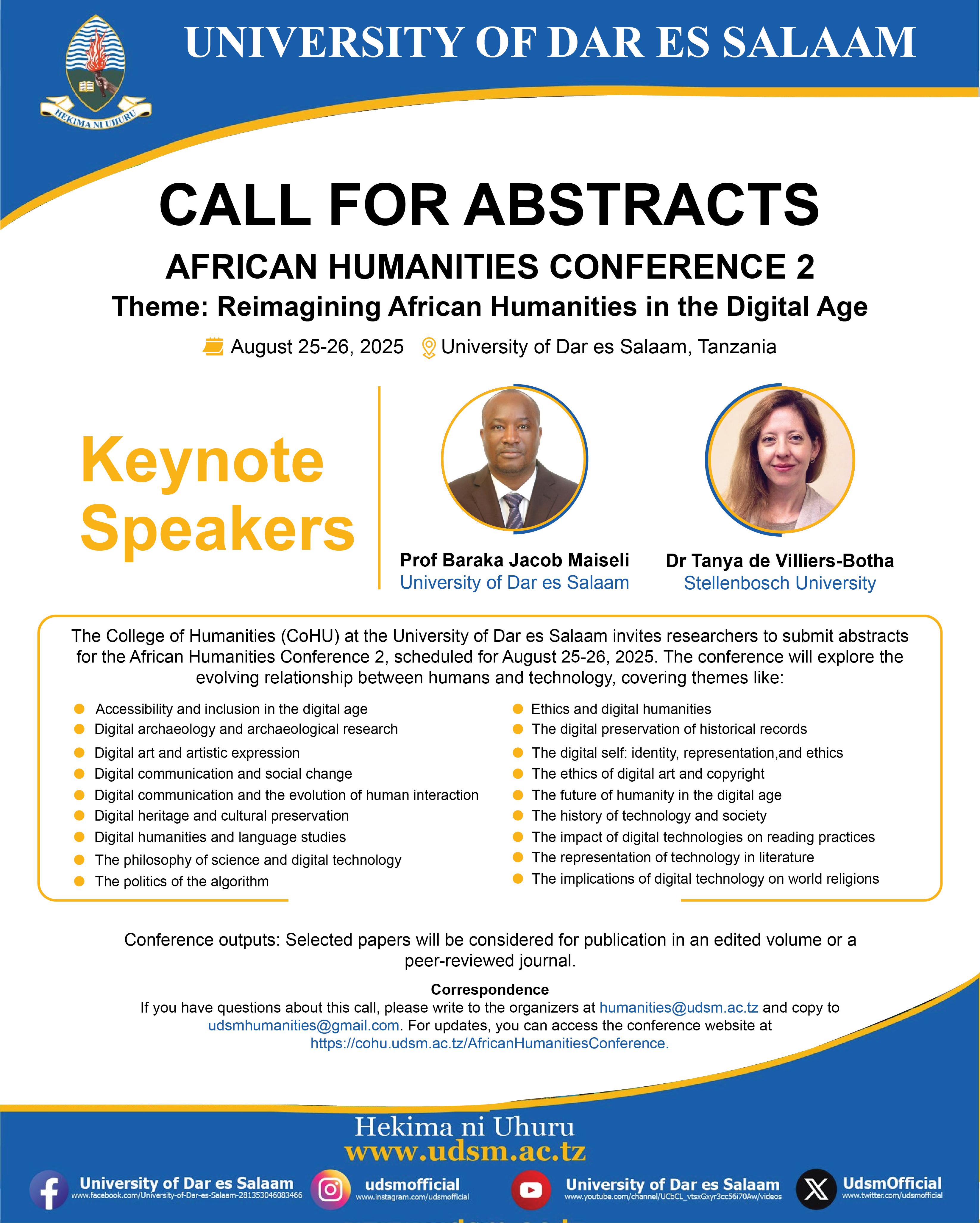African Humanities Conference 2025
25-26 August 2025 Dar es Salaam , Tanzania
Important Dates
The College of Humanities (CoHU) at the University of Dar es Salaam, Tanzania, invites submissions for the African Humanities Conference 2, scheduled for August 25-26, 2025. This year’s theme is "Reimagining African Humanities in the Digital Age." The conference will explore the relationship between humans and technology across various themes, including the impact of digital technologies on language studies, accessibility and inclusion, representation of technology in literature, historical human-technology interactions, the future implications of emerging technologies and ethical issues around artificial intelligence. We welcome researchers to submit abstracts on the following sub-themes.
CONFERENCE SUB-THEMES
● Digital Humanities and Language Studies: Exploring the use of digital tools and resources in linguistic research, including corpus linguistics, text mining, and the development of digital language archives; multilingualism and Artificial Intelligence; and digital discourse analysis.
● Accessibility and Inclusion in the Digital Age: Investigating the challenges and opportunities of ensuring equitable access to digital technologies and resources for all language users, including those with disabilities and those from marginalized communities.
● The Representation of Technology in Literature: Analyzing how technology is portrayed in contemporary literature, including its impact on human identity, relationships and society, and digital storytelling in oral literature.
● The Impact of Digital Technologies on Reading Practices: Investigating the impact of digital technologies on reading habits, including the rise of e-reading, the decline of print media, and the changing nature of the reading experience.
● The History of Technology and Society: Examining the historical impact of technological advancements on social structures, economic systems, and cultural values.
● The Digital Preservation of Historical Records: Investigating the challenges and opportunities of preserving and accessing historical records in the digital age, including the development of digital archives and the long-term sustainability of digital data.
● Digital Archaeology and Archaeological Research: Exploring the use of digital technologies in archaeological research, including Geographic Information Systems (GIS), 3D modelling, and remote sensing technologies.
● Digital Heritage and Cultural Preservation: Investigating the use of digital technologies to enhance public engagement in preserving and protecting archaeological sites and cultural heritage, including virtual reality reconstructions and online museums.
● Digital Art and Artistic Expression: Exploring the emergence of new forms of digital art, including digital painting, video art, interactive art, and computer-generated art. Investigating how digital technologies are transforming artistic practices, including the use of digital tools for creation, production, and dissemination.
● The Ethics of Digital Art and Copyright: Examining the ethical implications of digital art, including issues of copyright, authenticity, and the potential for AI-generated art to displace human artists.
● Digital Communication and the Evolution of Human Interaction: Investigating the impact of digital technologies on human communication, including the rise of social media, the changing nature of interpersonal relationships, the spread of misinformation, the rise of cyberbullying, and the digital divide.
● Digital Communication and Social Change: Investigating the role of digital communication technologies in social movements, political activism, and the promotion of social justice.
● The Philosophy of Science and Technology: Investigating the philosophical questions raised by the development and use of technology, including the nature of technology, its impact on human nature, and its relationship to human values.
● Ethics and Digital Humanities: Exploring the ethical frameworks for the development and use of digital technologies, including issues of privacy, surveillance, data security, and the potential for technology to cause harm.
● The Digital Self: Identity, Representation, and Ethics: How do digital technologies shape online identities? How is language used to construct and perform online self- presentation? How do literary texts represent and critique digital identities? What are the ethical implications of online self-presentation? How do digital technologies impact our understanding of authenticity and selfhood? How does online communication shape our sense of self and belonging? What are the ethical responsibilities of technology companies and policymakers to bridge the digital divide? How have concepts of identity and self-representation evolved in the digital age? How do digital technologies challenge traditional notions of identity and community?
● The Politics of the Algorithm: How do algorithms shape public discourse and political participation? What are the ethical implications of algorithmic bias and discrimination? How have historical power structures been reinforced or challenged by digital technologies? How do algorithms reflect and reinforce existing social inequalities? How do literary and artistic works explore and critique the power of algorithms in shaping our lives? How can creative expression challenge algorithmic control?
● The Future of Humanity in the Digital Age: What are the existential implications of increasing reliance on technology? How will digital technologies shape the future of human consciousness, creativity, and relationships? How can we learn from past technological revolutions to anticipate and mitigate the potential risks and challenges of the digital age? How can creative expression and public discourse envision and shape a more just and equitable future in the digital age? What is the role of humanities in developing AI? How does AI impact the humanities? What is the impact of digital technology on world religions?
